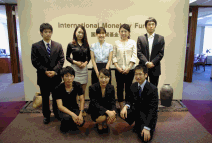
Typical street scene in Santa Ana, El Salvador. (Photo: iStock)
IMF Survey: Japanese Students Give Their Views on the Global Crisis
September 13, 2012
- 96 entries for International Monetary Fund student essay contest
- Winning entries draw on personal experience of global economic crisis
- Winners to participate in 2012 IMF-World Bank Annual Meetings in Tokyo
A heartfelt call for the IMF to remember that economic performance impacts ordinary lives, was among the winning entries in an essay competition for young Japanese students organized to raise awareness in Japan of the IMF-World Bank Annual Meetings taking place in October.

Daisuke Gatanaga, one of the three winners of the essay competition, whose personal experience of the global crisis provided the inspiration for his winning entry (photo: IMF)
IMF YOUTH DIALOGUE
The top three entries, selected from 96 submissions on “Youth Perspectives on the Global Economy and the Role of the IMF,” included an essay by Daisuke Gatanaga, a chemistry student, whose winning essay drew on his personal experience of the global economic crisis, when he saw people around him lose their jobs and confront “a seemingly cold and unsympathetic market.
“It is critical that the IMF not forget—amidst the objective numbers and data and calculations that go into monetary surveillance and analysis—that the economy affects real people, that there are real voices behind such statistics,” wrote Gatanaga.
Recovery for youth
Gatanaga shared top place with two fellow students: Kenji Nakada of the University of Tokyo and Tomoko Kaida of Kanazawa University. In her prize-winning essay, Kaida described her frustration and sense of helplessness at being young during an economic crisis.
“You feel like an ‘invisible’ observer, whose interests and future are at stake, yet you cannot influence events and partake in almost any way,” she wrote, before calling on the IMF to attach a “National Youth Policy Conditionality” to its lending instruments. Governments that expect to receive IMF support should have to demonstrate “youth-friendly economic policies,” she suggested.
The competition, organized by the IMF, the Japanese Ministry of Finance, and the Bank of Japan, was designed to offer a platform for the youth of that country to express their views on the current global situation, and serve as a reminder to the international community that decisions taken now will profoundly affect the lives of the young well into the future.

The eight finalists of the Japanese student essay competition which attracted 96 submissions from university students from all over Japan (photo: IMF)
Potential of Japanese youth
“I really enjoyed the inspiring remarks and the excellent command of English demonstrated by the eight finalists of the essay contest,” said Tomoyoki Fukumoto, of the Bank of Japan, who was one of the jury members.”
“Their performance convinced me of the great potential of the Japanese youth in the international community,” he added.
The contest attracted students from universities all over the country including the University of Tokyo, Hitotsubashi University, Kanazawa University, Nagoya University, Keio University, and Waseda University, who wrote on topics ranging from unemployment to rising food prices, poverty, institutional strengthening, and globalization.
“Through this essay contest, I was strongly encouraged that Japan has such promising youth,” said Hiroshi Naka, Secretary-General at the Japan Secretariat for the 2012 Annual Meetings of the IMF and the World Bank Group.
Contest part of wider youth engagement
The essay competition is part of a wider program of engagement with young people being undertaken by the IMF during its 2012 Annual Meetings in Tokyo this October. The Fund has also organized a youth dialogue event during the annual gathering that will be hosted by IMF Deputy Managing Director Nemat Shafik.
The three students will participate in a panel discussion on the future of youth in Asia, alongside fellow students from China, Korea, Singapore, and Thailand. The topics expected to be raised include youth unemployment, and the participants’ vision of their own future, as well as ideas about how the Fund can be more responsive to their needs.


